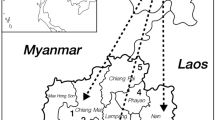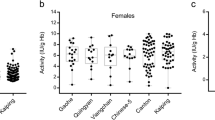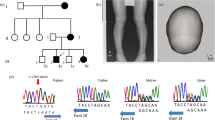Abstract
WE were led to look for the presence of this trait in Nigeria because of the demonstration that 10 per cent of American Negroes are deficient in this enzyme1 and the discovery that hæmolytic anæmia caused by certain drugs (for example, primaquine) develops only in the presence of this sex-linked inherited deficiency of red cell glucose-6-phosphate dehydro-genase2.
This is a preview of subscription content, access via your institution
Access options
Subscribe to this journal
Receive 51 print issues and online access
$199.00 per year
only $3.90 per issue
Buy this article
- Purchase on Springer Link
- Instant access to full article PDF
Prices may be subject to local taxes which are calculated during checkout
Similar content being viewed by others
References
Beutler, E., Blood, 14, 103 (1959).
Garson, P. E., Flanagan, C. L., Ickes, C. E., and Alving, A. S., Science, 124, 484 (1956). Szeinberg, A., Sheba, C., and Adam, A., Nature, 181, 1256 (1958). Gross, R. T., Hurwitz, R. E., and Marks, P. A., J. Clin. Invest., 37, 1176 (1958). Childs, B., Zinkham, W., Browns, E. A., Kimbro, R. L., and Torbert, J. V., Bull. Johns Hopkins Hosp., 102, 21 (1958).
Motulsky, A. G., and Campbell, J. M., Blood (in the press).
Author information
Authors and Affiliations
Rights and permissions
About this article
Cite this article
GILLES, H., WATSON-WILLIAMS, J. & TAYLOR, B. Glucose-6-Phosphate Dehydrogenase Deficiency Trait in Nigeria. Nature 185, 257–258 (1960). https://doi.org/10.1038/185257b0
Issue Date:
DOI: https://doi.org/10.1038/185257b0
This article is cited by
-
Haemoglobinuria among children with severe malaria attending tertiary care in Ibadan, Nigeria
Malaria Journal (2012)
-
Erythrocyte Glucose-6-phosphate Dehydrogenase Deficiency in Uganda
Nature (1967)
-
Erythrocyte Glucose-6-Phosphate Dehydrogenase Deficiency in West Africa
Nature (1961)
-
Glucose 6-phosphate Dehydrogenase Deficiency, Haptoglobin Groups, Blood Groups and Sickle Cell Trait in the Bantus of West Belgian Congo
Nature (1960)
Comments
By submitting a comment you agree to abide by our Terms and Community Guidelines. If you find something abusive or that does not comply with our terms or guidelines please flag it as inappropriate.



